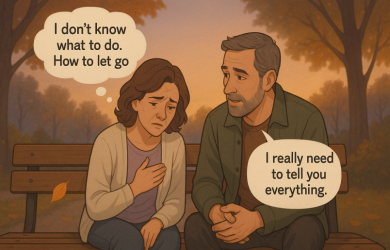Learning To Forgive: 6 Steps to Forgiveness In Relationships

Key Takeaways
Marriage.com AI Quick Summary
Forgiveness is a vital skill for surviving any relationship. Before you jump into marriage, you have to be sure that all the issues are resolved before resentment builds. Resentment is the root of all evil when it comes to relationships and marriage, so communicating and forgiving are essential.
Working through forgiveness issues can be difficult. However, working through such issues after marriage—particularly if the issues involve your spouse—can make you feel even more exposed. In marriage, the emotional stakes are even higher, and there is less space to “hide” in the relationship. That’s why processing through any issues is so crucial prior to marriage.
Before you marry, re-examine any old wounds that could impact your relationship. Whether the wounds were inflicted by your fiancé or someone else, these wounds could easily rupture under the strain of a new marriage. Even if your issues do not directly pertain to your fiancé, your future spouse will likely be affected by any bitterness you are carrying.
To forgive, we must first admit the injury—to ourselves and usually to the person who wounded us. Once we have acknowledged our pain, we can begin to move forward. Below are some steps to help you work through your injuries and begin the process of forgiveness.
1. Cultivate compassion
Compassion is often the last thing we want to give a person who hurt us. But in order to forgive—and therefore, set ourselves free from bitterness—we must be able to see some measure of humanity in our offenders.
Struggling to find any redemptive traits in the person who hurt you? Remember that the person likely bears scars of their own that affect how they interact with others. This does not excuse their wrong behavior, but it may allow you to feel just enough empathy to make forgiveness possible for the sake of your marriage.
Dr. Jennifer Schulz, PhD in Psychology, explains,
When someone hurts us, it’s natural to feel angry and view that person in a negative light. However, it can be helpful to remember that this is another human being trying to do their best, and their hurtfulness was likely unintentional, and just a manifestation of their own struggles.
2. Process through deep wounds before you seek an apology
You may not feel the need to seek an apology for every broken relationship. But if the person who hurt you is someone you still want in your life, you may need to discuss the matter with them in order to move on in the relationship.
For significant wounds, spend time processing through the pain—privately, or with the support of a trustworthy friend or a professional therapist—before you confront the injuring party. This will allow you to defuse some of the most combustible emotions associated with the pain before re-engaging with the person.
3. Take a timeout
For relatively smaller issues, it may still be best to take some time to cool down first. This will allow you to be more objective in your confrontation and to be more articulate about what is really bothering you. Not every injury is intentional—try to give the other person the benefit of the doubt, especially in relation to lesser offenses. Or better yet, ask the person to clarify what they meant to make sure you are accurately interpreting their behavior.
4. Be specific about the nature of the injury
Avoid phrases like, “You never …” and “You always ….” Often, these statements are an exaggeration and will put the other person on the defensive or make it easier for them to dismiss your claims. Try to pinpoint specific words or actions that hurt you and share how those words or actions made you feel.
5. Avoid character accusations and name-calling
Do not make sweeping accusations about the person’s character (e.g., “You are a terrible person”) and never resort to name-calling. Such tactics are not fair and almost always provoke a hostile reaction from the other person.
You may experience a momentary sense of vindication by using such language, but it will not help you get what you are really looking for—a validation of your feelings and some expression of remorse by the other person.
6. Understand that forgiveness is often an ongoing process
Even after the confrontation, you may still find yourself battling feelings of resentment. The apology, if any, may have been unsatisfying. Even if the apology was satisfactory, you may still find old feelings of resentment popping up from time to time. Simply acknowledge the pain as it surfaces and renew your inner pledge to forgive.
Dr. Schulz states,
Ultimately, staying committed to forgiveness sets you free from resentment, while healing your marriage in the process.
Forgiveness may not come instantaneously, but by renewing your commitment to forgive, you purge your heart—and your future marriage—of potential toxins.
 Tips
Tips
Write your tip or submit a video tip
All tips are reviewed before the publishing.
Share this article on
Want to have a happier, healthier marriage?
If you feel disconnected or frustrated about the state of your marriage but want to avoid separation and/or divorce, the marriage.com course meant for married couples is an excellent resource to help you overcome the most challenging aspects of being married.
Recent Articles
Related Quizzes
Unlock Daily 30-Sec Tips for a Happier, Healthier Relationship
👉 Subscribe FREE on YouTube We'd love your feedback!
We'd love your feedback!
 Expert Q&A
Expert Q&A
Ask your question related to this topic & get the support you deserve from experts.


















 Thanks for your feedback!
Thanks for your feedback!